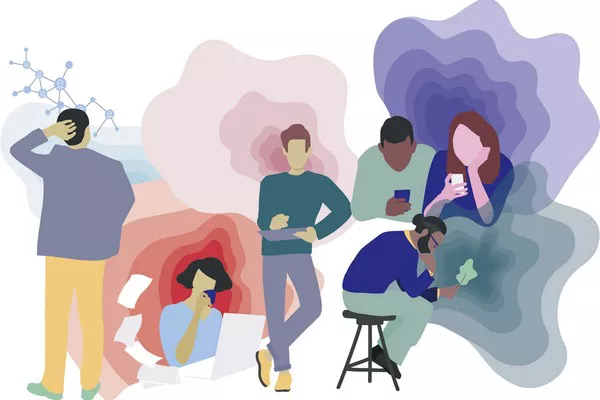In recent years, social media has become an integral part of our lives, offering numerous benefits in terms of connectivity and information sharing. However, it is essential to recognize the potential negative impact that excessive social media use can have on mental health. In this article, we delve into the detrimental effects of social media on mental well-being. By understanding the various ways in which social media can negatively affect mental health, individuals can make informed decisions about their social media usage and implement strategies to maintain a healthy balance in the digital world.
Social Comparison and Self-Esteem
a. Highlight Reels vs. Reality: Social media platforms often present a distorted version of reality, where users showcase their best moments, achievements, and carefully curated lifestyles. This can lead to social comparison and feelings of inadequacy when individuals compare their lives to others.
b. Unrealistic Beauty Standards: Social media platforms are inundated with images and ideals of beauty that can be unrealistic and unattainable. Constant exposure to these standards can negatively impact body image and self-esteem, leading to dissatisfaction with one’s appearance.
c. Fear of Missing Out (FOMO): Social media feeds are filled with posts about social gatherings, events, and experiences. Constant exposure to others’ exciting activities can fuel FOMO and a sense of exclusion, contributing to feelings of loneliness and dissatisfaction with one’s own life.
Cyberbullying and Online Harassment
a. Anonymous Negative Feedback: Social media platforms provide an environment where individuals can easily hide behind anonymous profiles to engage in cyberbullying, harassment, or hurtful comments. Such negative experiences can have a severe impact on mental health, leading to anxiety, depression, and social isolation.
b. Permanence and Virality of Content: In the digital age, harmful content, including cyberbullying incidents, can quickly spread and remain accessible indefinitely. The constant fear of being targeted or exposed to online harassment can significantly impact mental well-being.
c. Comparison and Shaming: Social media can become a breeding ground for public shaming and judgment, with users often subjecting one another to criticism and ridicule. This culture of comparison and judgment can contribute to feelings of insecurity and self-doubt.
Social Isolation and Loneliness
a. Superficial Connections: While social media offers the illusion of connectivity, it can sometimes replace meaningful, face-to-face interactions. Spending excessive time on social media can lead to social isolation, as individuals prioritize virtual connections over real-life relationships.
b. Fear of Disconnection: The fear of being disconnected from social media can drive individuals to constantly check their profiles, respond to notifications, and seek validation through likes and comments. This obsession can lead to increased anxiety and a diminished sense of self-worth.
c. Social Comparison and Isolation: Social media platforms can contribute to feelings of loneliness and isolation, as individuals compare their social lives to those displayed online. This constant comparison can lead to a distorted perception of one’s own relationships and a sense of social inadequacy.
Sleep Disturbances and Addiction
a. Blue Light Exposure: The use of electronic devices, including smartphones and tablets, before bedtime can disrupt sleep patterns due to the exposure to blue light. Poor sleep quality and inadequate rest can have a significant impact on mental health, leading to increased anxiety and mood disorders.
b. Constant Connectivity: Social media can create an addictive cycle, as individuals feel compelled to constantly check their feeds, respond to notifications, and seek validation. This addiction to social media can lead to decreased productivity, increased stress levels, and a preoccupation with virtual interactions.
c. Fear of Missing Out on Online Interactions: The fear of missing out on social media updates and notifications can lead to increased anxiety and restlessness, further impacting sleep quality and overall mental well-being.
Distorted Perception of Reality and Mental Health
a. Filtered and Idealized Lives: Social media platforms often portray an idealized version of life, with users showcasing only positive aspects. This constant exposure to filtered content can create an unrealistic perception of reality, potentially leading to feelings of discontentment and dissatisfaction with one’s own life.
b. Influence on Mental Health Discussions: While social media can be a platform for mental health discussions and support, it can also perpetuate harmful narratives and stigmatization. Misinformation, triggering content, and unqualified advice can be detrimental to individuals struggling with mental health issues.
c. Social Media Fatigue and Overload: The constant barrage of information, opinions, and social interactions on social media can contribute to mental exhaustion and overwhelm. This social media fatigue can lead to increased stress, anxiety, and a negative impact on overall mental well-being.
Conclusion
While social media platforms offer immense opportunities for connectivity and information sharing, it is crucial to acknowledge and address the negative impact they can have on mental health. From social comparison and cyberbullying to social isolation and addiction, social media’s detrimental effects can significantly impact mental well-being. By recognizing these challenges and implementing strategies to manage social media usage, individuals can protect their mental health and maintain a healthy balance between the digital world and real-life interactions. It is essential to prioritize self-care, establish boundaries, and seek support when needed to ensure a positive and mindful approach to social media consumption.


